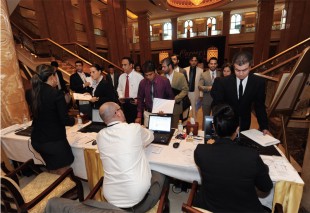

Staff poaching causes big strain for UAE hotels

A string of high-profile openings in the emirates is forcing hoteliers to rethink approaches to recruitment and retention as employee poaching persists.
Thousands of employees have hopped from one operator to another over the past year following a series of hotel openings and careers days in the UAE. Just last month, Kempinski offered 200 jobs on the spot at its first regional careers day held at the Emirates Palace in Abu Dhabi.
Kempinski estimated that 80% of the 322 jobs available in the Middle East had been filled during the one-day event, with 46% of successful candidates from outside the group.
In November, a staggering 5137 candidates from the area flocked to two careers days held by the soon-to-open 550-key Conrad Dubai, with candidates being offered contracts on site.
The new Fairmont The Palm Dubai was another property that targeted potential candidates on its doorstep in 2012, with a two-day careers fair held from July 16-17. A number of months earlier, Starwood sought out talent in the emirates during a recruitment event at the Sheraton Dubai Creek Hotel & Towers.
Mark Voller, resident manager of the recently-opened Ocean View Hotel on The Walk JBR, said as many as 50% of its staff base had been recruited from existing hotels in Dubai.
In with the new
Existing hotels have also joined in the search for potential talent hiding out at neighbouring hotels, with Raffles Dubai hosting a careers day on December 15 for 16 staff vacancies.
“It’s important to constantly search for talented and enthusiastic individuals so we thought hosting a careers day was an opportunity to open up to this talent, and not just searching for vacancies we have now, but also for future vacancies to be ahead of the game,” HR director Melissa Salibi told Hotelier.
She said the careers day was a chain reaction to the loss of staff to other hotels that had recently held careers days.
“We need to make sure that we are ready for it [loss of staff] rather than having a big shock — it’s good for our brand to be out there and known,” said Salibi.
Raffles Dubai is not the only property to up its recruitment efforts by seeking out staff before the vacancies arise.
“We’re not only recruiting for vacancies today we’re trying to look ahead. So we’ve changed from looking for people when we need them to always looking. If you find some bright stars, you hire them because eventually you’ll have turnover anyway,” said Traders Hotel Dubai GM Stephan Kapek.
Furthermore, the hotel group has resorted to upgrading its recruitment process to enable staff already working in the firm to apply for transfers more easily, enticing them to move within the company.
Article continues on next page ...
Retention attention
The struggle for staff in the emirates has also spurred operators to rethink retention tactics.
Having witnessed a number of staff leaving following the careers fairs of upcoming hotels, Citymax Bur Dubai GM Walter Knight has appointed dedicated trainers and consultants to upgrade the training offered in an attempt to encourage staff to develop within the company.
“Training, accommodation, recreation, team building exercises – that’s probably the secret,” he told Hotelier.
While “stolen” staff remains a strain for hotels, the operators said there are no hard feelings: “I will not stop inviting my HR competitors for lunch because they stole my staff. It is poaching, it does happen but we’re proud of what we offer, of the training of our staff and if they happen to be taken I’m proud of them,” said Salibi.
Knight said: “I don’t blame anybody for poaching staff because everybody is poaching everybody else’s staff, it’s not something you’re going to change. The GM of the hotel or F&B director goes somewhere and has a meal, notices someone good and if they have a position available they’re obviously going to approach him.
“Hotels and particularly hotel owners in Dubai have to be a lot more active in retaining staff,” he added. However, Learnpurple UAE managing director Lynne Bellinger said she had heard numerous complaints from hotels regarding their neighbours’ careers days.
“Although it is a very effective recruitment method, it affects not only neighbour hotels, but all hotels within the emirate,” she said, adding that there are ways operators can avoid aggravating their peers.
Having organised careers days for five-star hotels in the region, she said two rules should be followed: “Candidates working locally in hotels must have completed at least two years with their current employer.
This demonstrates loyalty from the employees and that they can remain in a job for a decent length of time. It also shows respect to the other hotels by not taking their people, who they’ve invested time and money in, prematurely.
“Secondly, no more than three to five people should be hired from any one hotel, depending on its size. This is also a practice that hotels should follow while recruiting from overseas, ensuring that any one hotel is not greatly affected by this means of mass recruitment,” Bellinger concluded.
The story in short
A number of high-profile openings in the emirates, including the upcoming Conrad Dubai, Fairmont The Palm and the second phase of JW Marriott Marquis, has led to a rise in the already-high rate of staff movement in Dubai. Rather than fret over stolen staff, it seems existing hotels have got savvy to staff poaching and instead are investing in staff retention.
A number of operators have said they’re investing in training programmes and new approaches to recruitment to encourage development within the company. However, the chains agree that some candidates will be enticed to a new hotel for a few more dirhams, whatever the circumstances.
To find loyal staff and respect your neighbours, one HR expert suggests hiring staff who have worked for a minimum of two years at their current hotels, and limiting the number of employees poached from any one property.